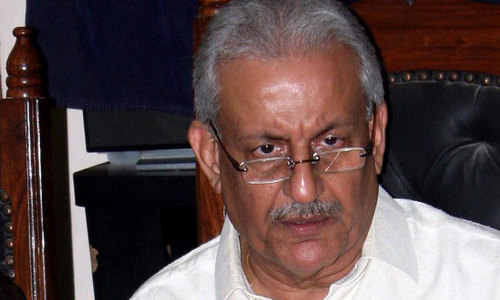LAHORE: PPP Chairman Bilawal Bhutto’s direction to the Sindh and Azad Kashmir governments to lift the decades-old ban on student unions in educational institutions may force other provinces to follow suit.
The mainstream student organisations like Islami Jamiat Talaba (IJT), Muslim Students Federation (MSF), Peoples Students Federation (PSF) and Insaf Students Federation (ISF) believe the other provinces, especially Punjab, may find no excuse if student unions are restored in Sindh and AJK and elections are held subsequently.
Bilawal’s announcement and the Senate’s taking up of this matter have rekindled the hope that ‘healthy’ political activities may again begin in colleges and universities after an over three-decade ban on the student unions.
Senate Chairman Raza Rabbani last week termed the ban on student unions in educational institutions “unconstitutional” and referred the matter to a committee of the whole house to submit recommendations.
Subsequently, Mr Bilawal not only directed the PPP governments in Sindh and AJK to lift the ban on student unions to allow students to participate in healthy democratic activities in preparation for their future role in national politics but also asked them to make appropriate legislation and rules in this regard.
The mainstream student organizations have welcomed Bilawal and Rabbani’s initiative saying it should be translated into student unions elections and not mere announcement like the one Yousuf Raza Gilani had made after assuming the prime minister’s office in 2008.
Mr Gilani had announced lifting the ban on student unions but practically it remained imposed.
“We welcome any move to lift the ban on student unions as it is a genuine platform which provides leadership to the country. Mr Bilawal must ensure that the ban on unions should be practically lifted in Sindh and AJK.
Similarly, the Punjab and Khyber-Pakhtunkhwa governments should also announce lifting the ban on unions and let the students take part in healthy political activities,” IJT’s Pakistan Nazim Zubair Hafeez told Dawn.
He said the IJT would mobilise students voice in this regard and put pressure on Punjab and KP governments in this regard.
Mr Hafeez said the government should better review the report of the vice-chancellors committee that made a comparison of 10 years after and before the ban on student unions. “There was more violence on the campuses after the ban on student unions,” he quoted the report as having mentioned.
“Members of student unions in varsities’ syndicates would not allow regular hikes in tuition fee,” he said.
“All student organizations on a joint platform of the Mutahidda Talaba Mahaaz had pledged to have a certain code of conduct for the unions. Therefore, we don’t see any issue on the campuses if the government lifts the ban on them (unions),” he said.
MSF’s Pakistan president MPA Rana Arshad said the MSF also wanted the restoration of student unions in educational institutions.
“The parliamentarians and vice-chancellors should be taken on board to give suggestions to formulate a code of conduct for student unions and no political party should be allowed to patronise a student organisation and election should be held on a non-party basis,” he suggested.
Mr Arshad said the Punjab government would like to lift the ban on unions as it was already facilitating students by setting up an endowment fund, distributing merit-based laptops, sending the brilliant students abroad and organising youth festivals.
PSF Secretary-General Zohaib Butt said Mr Bilawal had accepted the demand of the PSF and ordered restoration of the student unions where the PPP was ruling.
“Now the Punjab and KP governments should follow suit. If these governments do not restore the unions we will mobilise students against them and launch a campaign,” he said.
To a question whether Mr Bilawal wants mobilisation of the youth through lifting the ban on political activities of the students, Mr Butt said the step would help produce ideological politicians.
“Students in Sindh colleges and universities are very happy over Bilawal’s announcement,” Mr Butt said.
Punjab’s Insaf Students Federation (ISF) vice-president Abdul Monim Lodhi said he did not agree with the perception that the student unions promoted violence on the campuses.
“The provincial governments should invite all stakeholders and devise a code of conduct before lifting the ban on student unions,” he said.
The ban on student unions was imposed by the regime of Gen Ziaul Haq in 1984. Later, the orders were rescinded by the Benazir Bhutto’s government in 1988.
Some three years later the student unions were challenged in the apex court on grounds that they were contributing to “on-campus violence”. The court in 1993 imposed a ban on the student unions.
The student organisations are of the view that the elite would continue emerging on the political scene if the students belonging to lower and middle classes are deprived of taking part in on-campus political activities. “Leaders like Javed Hashmi, Sirajul Haq, Sheikh Rashid, Ahsan Iqbal, Liaquat Baloch, Jehangir Badr, Pervaiz Rashid, Saad Rafique and Hussain Haqqani have been groomed on the campuses,” Zubair Hafeez said.
Published in Dawn, January 18th, 2016













































